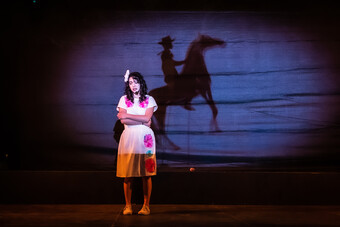In Search of the Artistic Home
Jamie Gahlon has asked theatre artists from around the country to talk about their personal search for an artistic home. Jack Reuler continues this series.
What makes an artistic home?
It is possible that the artistic home is secondarily, or maybe even tangentially, about art. It is about mission and ideas and being genuinely welcoming, inviting, and respectful. It is about active listening, openness to new ideas and change, and a culture in which “I don’t know” and “Let’s try that” can be part of the core lexicon. It probably has a lateral flatter hierarchy and the artistic product is considered the fixed costs instead of the variable costs.
Define mission, vision, and values clearly. Live them. Practice radical generosity.
The 2012 artistic home needn't necessarily be about frequency of participation for the freelance artist, but the qualitative experience when there and the knowledge by that freelancer that s/he will be valued, rewarded, challenged, and part of something that has an emotional shelf life that lasts long after closing night. As we learned from David Houle at the last TCG conference, any organization’s CEO is now the Chief Experience Officer and, in our theatres, embraces the interconnected-ness of those that make the plays, those that support the making of the plays, those that report on the plays, and those that see the plays.
There should probably be exponentially more audience members that call a theatre their artistic home than artists. Together they can aspire to true greatness, however defined.
I do not think it’s the size of the paycheck or the number of Equity weeks of employment or perks that make an artistic home. The key ingredients to the secret recipe are respect and security. Can I trust that this place cares about the human chemistry of the people working together as well as their superb talent? Am I an equal among peers? May I question choices? Do the permanent players live the mission and may I hold mission, vision, and values as a litmus test to all that I see? If the greatest predictor of future behavior is past behavior, do I see myself as integral to the mission, vision, and values at this moment and, based on track record, again in some tomorrows? Am I spared unwelcome surprises and yet thrilled by the unpredictable?
One new employee this year claimed that he felt welcomed because I picked him up at the airport as he moved to town. One new employee this year felt that having his own key to the building signified value. The institution’s commitment to excellence should be part of any person’s decision to work anywhere at any time and so, to me, does not define the artistic home, but should be an everyday expectation of working at a convenience store, as a plumber, or in a theatre.
Where and how did you find yours and what does it mean to you?
I was twenty-two and had very specific racial politics that were out of sync with the prevailing (nonsensical) melting pot theory of the day. A provoking incident at a theatre inspired me to create a home at which a particular worldview could be espoused. Knowing that I would never be a preacher, politician, or orator, theatre became that voice and the Mixed Blood Theatre became my life, career, and artistic home.
I love my job, field, and the organization for which I work. Throughout time, I struggle to know who I am as an individual without that role (as leader of the Mixed Blood Theatre). It is simultaneously inspirational and unhealthy. But its role as artistic home is most rewarded by creating an environment in which many others can claim they have an artistic home.
How can one create and/or build an artistic home for others?
Define mission, vision, and values clearly. Live them. Practice radical generosity.
What is the artistic home of the future?
The artistic home is no longer a monolithic field-wide answer. For different segments of the field, the solution may be different. For playwrights, for example, her/his artistic home may well be his/her own home! With the establishment, evolution, and maturation of service organizations and alliances, the proliferation of new play funding, communication sophistications, and the interconnectedness of theatre leaders, a playwright may be able to access commissioning dollars, development opportunities, dramaturgical support, and ample showcases to let that playwright have research and development, marketing, and product. Instead of a single theatre championing the work of a writer, that individual may be a favorite child of a national community of theatres, yielding greater frequency of production and wider visibility, enhanced by not having a solitary home institution.
If power is defined as access to information, freelance theatre artists now know who is doing what and when and led by whom months and months in advance and can be their own advocates in their careers in new ways, digitally presenting themselves and their talents as self-advocates in self-empowering ways. Regional theatre alliances have blossomed across the country since TCG's publication of The Artistic Home, allowing a single community (or multiple communities) to be an embracing artistic home for many individuals in disparate ways, permitting theatres and individual artists to be simultaneously self-serving and collaborative.
Like the rest of society, the artistic home can be tailor-made by theatres, service organizations, training programs, and individuals in personally-customized ways, expanding horizons for the players and for the future of the art form.














Comments
The article is just the start of the conversation—we want to know what you think about this subject, too! HowlRound is a space for knowledge-sharing, and we welcome spirited, thoughtful, and on-topic dialogue. Find our full comments policy here
And a fine home it is. One in which it's ok to make stuff, take risks, argue with the Artistic Director. Thank you!